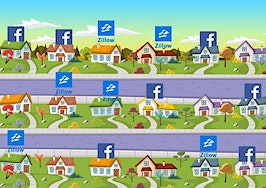A new generation of real estate middlemen now stand between consumers and agents.
Tech giants like Zillow Group, Facebook and Google are charging increasing fees for access to a growing share of homebuyers and sellers and tipping the scales in favor of agents and teams who can spend big, invest in technology and operate at lower margins. Smaller agents and big brokerages are under rising pressure to keep up.
Long term, the balance of power could turn on whether real estate professionals can foster customer loyalty and maintain their grip on listing leads, rather than allow middlemen to catch more sellers in their dragnet.
“The industry has the opportunity to fight the continued growth of digital middlemen if agents and brokers finally agree to partner on systematic, data-driven and long-term methods that deliver real value to buyers such that when they are ready to sell, the agent and the brokerage firm are both front and center,” said Russ Cofano, who has served in executive roles at eXp Realty, realtor.com and the Missouri Association of Realtors.
“It seems like we get farther and farther away from that each day.”
Digital marketing rises at breakneck pace
The typical agent still gets the largest share of their business from referrals and repeat customers, but the portion that comes through online channels is growing.
Twenty-eight percent of recent homebuyers found their agents through a real estate website or app, social media or search engine, compared to 33 percent from peer referrals or past customers, according to a new Zillow Group survey.

Source: Zillow Group
Digital middlemen including Zillow Group, realtor.com and Facebook are vacuuming up more and more real estate marketing dollars. But there are also notable new entrants.
Nextdoor, for example, has the potential to capture a vast number of leads now that the neighborhood social media site has introduced a real estate section and advertising. Amazon may move into real estate referrals as well.

Nextdoor’s real estate section
Middlemen of middlemen are even popping up. For example, Opcity, which recently closed a $27 million funding round, buys and screen leads from listings portals and then routes the leads to agents for referral fees.
Some agents and teams are even flipping leads with assistance from networks created by tech companies including Zillow Group and Agentology, a lead-screening and referral service that’s raised around $5 million.
“We have real estate agents where they start off as clients and they’re getting good … they’re starting to spend money on ads outside of their market just for the purpose of referring it out,” said Agentology co-founder Avi Ta. “A lot of agents just keep the seller and refer every buyer.”
The more links in the lead-distribution chain, the less money for the agents at the end. But the choice between more or less commission income is an easy one for many professionals.
Using digital middlemen as a ‘land grab’
Middlemen have made it easier than ever for agents to grow their business at a rapid pace.
Over the last five years, Barry Jenkins, a Virgina Beach, Virginia-based Realtor, has built a one-man shop into a 16-agent team — all on the back of online leads.
The majority of his business has come from Zillow and Facebook advertising, followed by referrals from past customers who originated as online leads.
“Country clubs and BBQs aren’t fun for me,” Jenkins said. “With online leads, I buy them, sell them a house, treat them right, and then stay very relevant to them.”
Agents are using digital marketing “as a land grab to acquire customers,” said Vik Chawla, a senior associate for Fifth Wall Ventures, which invests heavily in real estate tech.
The trend is likely to put pressure on half-in agents and fuel the formation of teams, who can pool resources to buy leads and streamline customer service.
‘High-caliber teams dominating’
As consumers move toward experiencing more and more online, rewards are in store for agents who do business with digital middlemen, according to Chawla.

Vik Chawla
“Those who do not participate will likely be left behind, resulting in high-caliber teams dominating local areas both because of their skills and because of their thoughtful marketing spend,” Chawla said.
The winning model, he believes, involves assigning a single local expert to hold a buyer or seller’s hand through every step of the process, backed up a transaction coordinator and other support.
The alternative assembly-line model, which involves passing clients between multiple agents and specialists, can allow teams to do more volume at lower margins. But this model is also more likely to leave customers underwhelmed, putting follow-on referrals and long-term sustainability at risk, Chawla said.
“For the vast majority [of online leads], which agent they decide to work with is based simply and almost solely on how quickly that person responds,” notes Jessie Beaudoin, CEO of CallAction.co, a platform that automates lead engagement. “The service that’s delivered after is the difference of whether that real estate agent is going to be referred or not in the future.”
Costs rising
Since online leads can be a ticket to explosive growth, agents are naturally bidding up their cost. Facebook’s price per ad more than quadrupled from 2014 to 2016 and is expected to increase much further.

This Facebook ad, which Barry Jenkins spent $180 to promote, has generated 20 seller leads and one listing (so far), he said.
Jenkins, the Virginia real estate agent, has found himself opening his wallet wider for Zillow in the past, so that competitors wouldn’t overtake him on Zillow’s local advertiser leaderboard.
“Personally, they’ve gotten more money out of me because I know if I give them $300 more per month, I’ll be the biggest person in my ZIP code,” he said. “It’s smart, but it’s also kind of annoying.”
Digital middlemen will always need to offer agents a minimum level of return on investment. The question is how little. In 2014, Zillow Group CEO Spencer Rascoff estimated that agents would be willing to spend up to 40 percent of their commission on “online impression-based advertising” — which is what Zillow sells to agents.
Spending per agent on digital advertising is likely to “increase exponentially in the coming years,” Chawla reckons.
But while many agents and analysts see rising ad fees, advertising research firm Borrell Associates reports that spending on digital real estate advertising actually slid in 2015 and 2016.
The trend is expected to reverse this year, with Borrell forecasting spending on digital advertising by agents and brokers to increase by 8.9 percent to $9.12 billion in 2017, accounting for $9 out of $10 spent by that group on marketing.

Borrell Associates/Inman News
But competition among digital middlemen could keep prices from spiraling out of control. Jenkins says he’s watched the cost of a Zillow lead roughly double in the last two years, and as a result, has started spending more on search engine ads and leads from the marketing service Ylopo (which he said snags leads through Facebook ads).
The tech arms race
To maximize ROI, agents will increasingly invest in technology and manpower to convert more leads into deals, including instant-response, customer relationship management (CRM) and follow-up tools.
Jenkins’ toolbox includes:
- Agent Legend, a voicemail, email and text follow-up system
- Agentology, a lead-screening and referral service
- Riley, whose concierges will send text messages to leads for months
- Follow Up Boss (CRM)
- Thanks.io, a provider of “automatic, handwritten postcards”
The rising cost of running a real estate business means agents “are going to need higher volumes and expect less net return — which again means less agents needed,” predicts Creed Smith, a Denver-area broker and the creator of a home style-based property search tool.
Traditional brokerages on shaky ground
Digital middlemen are also reshaping the brokerage landscape, eroding the value proposition of traditional firms and franchises.
Agents previously joined real estate brands largely for access to customers. But why pay for brand affiliation — in the form of high commission splits — when you can buy business opportunities directly?
Old-guard brokerages are coming under pressure to lower their splits, as cloud-based firms like eXp Realty and the commission-cap models — epitomized by Keller Williams Realty — spread like wildfire.

Russ Cofano
Many more lead-gulping teams will likely flock to brokerages that ask for less when the market cools, said Cofano, the eXp Realty and realtor.com vet.
“Brokers should be making a beeline to these agents to learn what they can do to increase broker value,” he said. “Unfortunately, for many, it will be purely economic in terms of lower fees, which is a challenge for many brokers.”
The war for listing leads
Agents now own the customer relationship more than brokerages, putting the power in their hands, according to Cofano. But digital middlemen are constantly testing these bonds, always seeking “to capitalize on the lack of relationship maintenance” by agents.
Digital middlemen have found much success with capturing buyers in large part because they’re more inclined to work with complete strangers, Cofano says.
But networking, referrals, past customers and brand awareness are still the dominant sources of listing leads for agents and brokerages. The big question is whether middlemen can figure out how to steer homesellers away from their previous buyer’s agents and into the arms of advertisers.
“That’s the prize,” Cofano said. “I can guarantee you that Zillow is working hard to figure out how to do that.”
Zillow Instant Offers represents the company’s boldest attempt at this. It reels in homeowners who ask for offers from investors, and then nudges the prospective sellers to work with Zillow agent advertisers.

A CMA from an agent advertiser appears beneath investor bids that are presented in emails sent to homeowners by Zillow Instant Offers
SmartZip and Offrs are among other companies that are peddling seller lead products, often using data analytics and a combination of online and print marketing to drum up potential listings.
‘Relationship maintenance’ may be key to power
To stem the flow of commission income to digital middlemen, agents and brokerages should work together to cement their ties to past clients, said Cofano. That, he said, will make it harder for middlemen to pick off and resell potential listings.
There is ample room for improvement. Zillow Group reports that only 17 percent of homesellers used an agent who they previously worked with (though that’s still nearly double the rate for buyers).

Source: Zillow Group
Agents and brokerages must uncover ways to “maintain a value relationship with their previous customers, so their customers don’t seek to go to the digital middlemen in the first place,” Cofano said.
Sending generic emails, cards and the odd gift here and there won’t cut it, he said.
First is an example of an innovative tool that could help agents with “relationship maintenance.” It predicts which members of an agent’s network are likely to move in the near future and nudges them to reach out.
Better Homes and Gardens Real Estate Tech Valley, an Albany, New York-area brokerage, cooked up another creative approach, building a “skill” for Alexa, Amazon’s intelligent personal assistant, that allows past customers to get service provider recommendations. (It’s licensing the technology to other brokerages.)
HomeBot, which provides information regarding a buyer’s mortgage and refinancing opportunities, is another system that brokerages can use to “generate mass customized value offerings to a buyer,” Cofano said.
But leveraging such services, he added, “requires trust between agent and broker and likely a sharing of value from that potential repeat client down the road as brokers likely can’t fund these efforts without some promise of additional future compensation.”
One big reason Redfin, a publicly-traded high-tech brokerage with a market cap of around $2 billion, can charge low fees is because the firm captures so many customers directly through its popular property search site.
Asked about real estate’s digital middlemen, Redfin CEO Glenn Kelman said: “Technology should facilitate direct connections between the consumer and the broker, acting as a road sign, not just a toll-both.”












